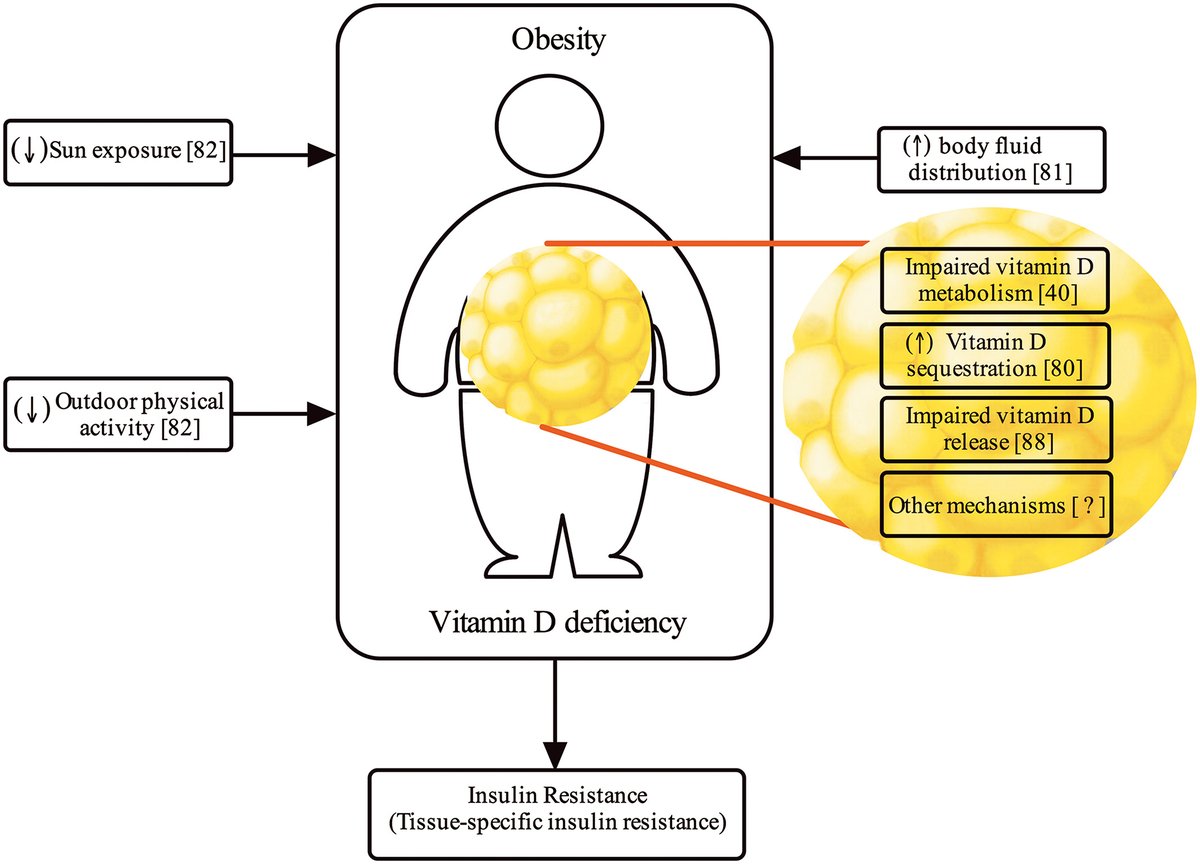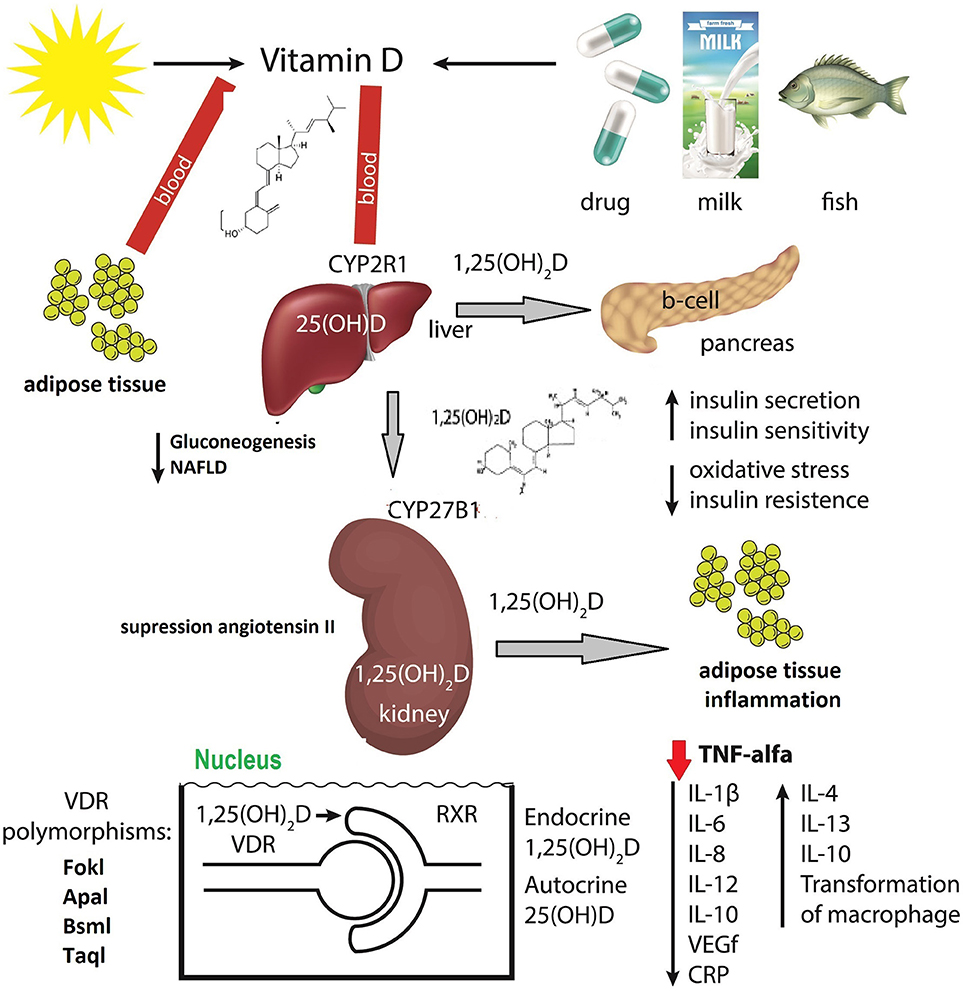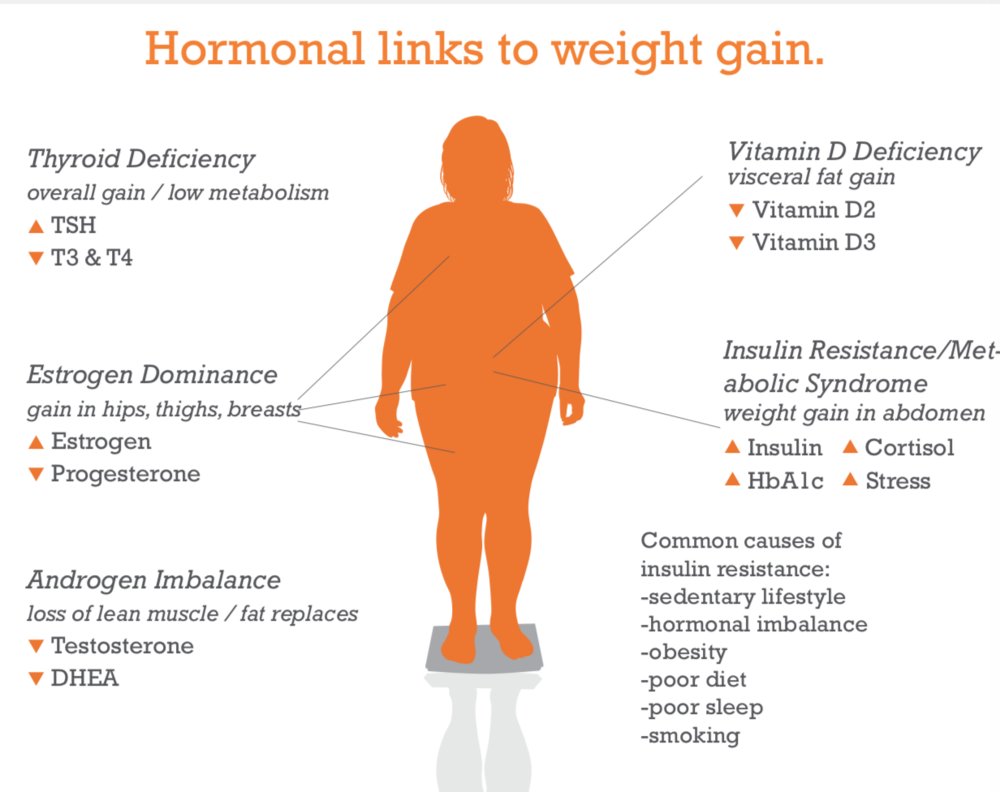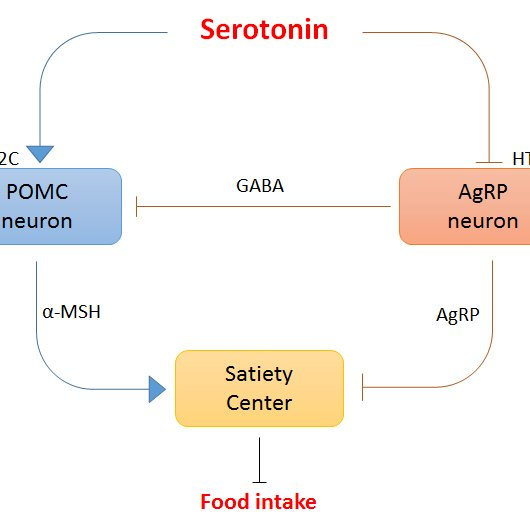Vitamin D is indispensable. The vitamin has major health benefits, including improved immunity and stronger bones. There is also mounting evidence that it could help lose WEIGHT. In turn, losing weight increases #VitaminD level too. Thread, explaining this relationship.
1. Higher BMI & body fat % are associated w/ lower blood levels of vitamin D.
a. In 154 obese subs serum 1,25-Vit D was significantly lower
https://pubmed.ncbi.nlm.nih.gov/15001609/
b.">https://pubmed.ncbi.nlm.nih.gov/15001609/... Authors conclude % body fat is inversely related to serum 25-OHD levels in healthy women
https://pubmed.ncbi.nlm.nih.gov/12519845/ ">https://pubmed.ncbi.nlm.nih.gov/12519845/...
a. In 154 obese subs serum 1,25-Vit D was significantly lower
https://pubmed.ncbi.nlm.nih.gov/15001609/
b.">https://pubmed.ncbi.nlm.nih.gov/15001609/... Authors conclude % body fat is inversely related to serum 25-OHD levels in healthy women
https://pubmed.ncbi.nlm.nih.gov/12519845/ ">https://pubmed.ncbi.nlm.nih.gov/12519845/...
c. Certain enzymes are needed to convert vitamin D into its active form, and levels of these enzymes may differ between obese and non-obese individuals. This article reviews possible mechanism for Lower 25D Concentrations in Obese Individuals
https://www.ncbi.nlm.nih.gov/pmc/articles/PMC3705328/#!po=68.7500">https://www.ncbi.nlm.nih.gov/pmc/artic...
https://www.ncbi.nlm.nih.gov/pmc/articles/PMC3705328/#!po=68.7500">https://www.ncbi.nlm.nih.gov/pmc/artic...
d. A 2012 study reported adjusting Vitamin D levels in obese individuals reduced the difference in Vitamin D levels among obese and non-obese individuals. This indicates vitamin D needs to depend on body size, & obese need more than normal-weight people. https://pubmed.ncbi.nlm.nih.gov/22262154/ ">https://pubmed.ncbi.nlm.nih.gov/22262154/...
2. Interestingly, losing weight can also affect vitamin D levels.
a. RCT (2012) reported weight loss, presumably associated with a reduction in body fat, is associated with increased serum 25(OH)D concentration in overweight or obese women (n=383). https://pubmed.ncbi.nlm.nih.gov/22402737/ ">https://pubmed.ncbi.nlm.nih.gov/22402737/...
a. RCT (2012) reported weight loss, presumably associated with a reduction in body fat, is associated with increased serum 25(OH)D concentration in overweight or obese women (n=383). https://pubmed.ncbi.nlm.nih.gov/22402737/ ">https://pubmed.ncbi.nlm.nih.gov/22402737/...
b. A study in 439 post-menopausal women reported participants who lost at least 15% of their body weight experienced a 3 times greater increase in Vit-D level than those who lost 5–10% of their body weight. https://www.ncbi.nlm.nih.gov/pmc/articles/PMC3127511/">https://www.ncbi.nlm.nih.gov/pmc/artic...
3. Higher Vitamin D Levels May Aid Weight Loss
a. RCT w/ 218 overweight & obese women, found that women who fulfilled their vitamin D requirements experienced more weight loss (3.2 kg) than the women who did not have adequate blood levels. https://pubmed.ncbi.nlm.nih.gov/24622804/ ">https://pubmed.ncbi.nlm.nih.gov/24622804/...
a. RCT w/ 218 overweight & obese women, found that women who fulfilled their vitamin D requirements experienced more weight loss (3.2 kg) than the women who did not have adequate blood levels. https://pubmed.ncbi.nlm.nih.gov/24622804/ ">https://pubmed.ncbi.nlm.nih.gov/24622804/...
b. A study in over 4,600 elderly women found that higher levels of vitamin D were linked to less weight gain between visits during the span of the 4.5-year study. https://www.ncbi.nlm.nih.gov/pmc/articles/PMC3466912/">https://www.ncbi.nlm.nih.gov/pmc/artic...
4. Possible theories on how Vitamin D Aid Weight Loss?
a. Vitamin D could suppress the storage of fat cells, effectively reducing fat accumulation https://pubmed.ncbi.nlm.nih.gov/18254883/ ">https://pubmed.ncbi.nlm.nih.gov/18254883/...
a. Vitamin D could suppress the storage of fat cells, effectively reducing fat accumulation https://pubmed.ncbi.nlm.nih.gov/18254883/ ">https://pubmed.ncbi.nlm.nih.gov/18254883/...
b. Vitamin D can increase levels of serotonin, a neurotransmitter that regulates everything from mood to sleep regulation. Serotonin also controls appetite and can increase satiety, reduce body weight, and decrease calorie intake.
https://pubmed.ncbi.nlm.nih.gov/22249823/ ">https://pubmed.ncbi.nlm.nih.gov/22249823/...
https://pubmed.ncbi.nlm.nih.gov/22249823/ ">https://pubmed.ncbi.nlm.nih.gov/22249823/...
c. Higher levels of vitamin D may be associated with higher levels of testosterone, which could trigger weight loss. A study with 165 men found that those receiving Vitamin D experienced greater increases in testosterone levels than the control group. https://pubmed.ncbi.nlm.nih.gov/21154195/ ">https://pubmed.ncbi.nlm.nih.gov/21154195/...
SUMMARY:
- There’s an intricate relationship between vitamin D status and body weight. Getting enough vitamin D may help enhance weight loss and decrease body fat.
- In turn, losing weight can increase vitamin D levels and help you maximize its other benefits.
- There’s an intricate relationship between vitamin D status and body weight. Getting enough vitamin D may help enhance weight loss and decrease body fat.
- In turn, losing weight can increase vitamin D levels and help you maximize its other benefits.

 Read on Twitter
Read on Twitter





